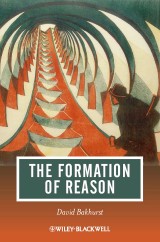Details

The Formation of Reason
Journal of Philosophy of Education 1. Aufl.
|
21,99 € |
|
| Verlag: | Wiley-Blackwell |
| Format: | |
| Veröffentl.: | 21.03.2011 |
| ISBN/EAN: | 9781444395327 |
| Sprache: | englisch |
| Anzahl Seiten: | 202 |
DRM-geschütztes eBook, Sie benötigen z.B. Adobe Digital Editions und eine Adobe ID zum Lesen.
Beschreibungen
In <i>The Formation of Reason</i>, philosophy professor David Bakhurst utilizes ideas from philosopher John McDowell to develop and defend a socio-historical account of the human mind. <ul> <li> <div>Provides the first detailed examination of the relevance of John McDowell's work to the Philosophy of Education</div> </li> <li> <div>Draws on a wide-range of philosophical sources, including the work of 'analytic' philosophers Donald Davidson, Ian Hacking, Peter Strawson, David Wiggins, and Ludwig Wittgenstein</div> </li> <li> <div>Considers non-traditional ideas from Russian philosophy and psychology, represented by Ilyenkov and Vygotsky</div> </li> <li> <div>Discusses foundational philosophical ideas in a way that reveals their relevance to educational theory and practice<br /> </div> </li> </ul>
Acknowledgements <p>Foreword</p> <p>Author’s Preface</p> <p><b>1. What Can Philosophy Tell Us About How History Made the Mind?</b></p> <p>What Role for Philosophy?</p> <p>Wittgenstein and Davidson</p> <p>Wittgenstein and Davidson Contrasted</p> <p>McDowell</p> <p>The Idea of <i>Bildung</i></p> <p>Understanding the <i>Bildungsprozess</i></p> <p>The Conceptual and the Practical</p> <p>Conclusion</p> <p><b>2. Social Constructionism</b></p> <p>Social Constructionism Introduced</p> <p>The Social Construction of Reality</p> <p>Why Bother About Global Constructionism?</p> <p>Against Global Constructionism</p> <p>Matters Political</p> <p>The Social Construction of Mental States</p> <p>Why Mental States Are Not Socially Constructed</p> <p>The Social Construction of Psychological Categories</p> <p>Conclusion</p> <p><b>3. Self and Other</b></p> <p>Problems of Self and Other</p> <p>The Problem of Self and Other in One’s Own Person</p> <p>Strawson on Persons</p> <p>Wiggins on Persons and Human Nature</p> <p>The Significance of Second Nature</p> <p>Further Positives</p> <p>Conclusion: Two Cautionary Notes</p> <p><b>4. Freedom, Reflection and the Sources of Normativity</b></p> <p>McDowell on Judgement</p> <p>Owens’s Critique</p> <p>Defending Intellectual Freedom</p> <p>Freedom and the Sources of Normativity</p> <p>Sources of Normativity I: Practical Reasoning</p> <p>Sources of Normativity II: Theoretical Reasoning</p> <p>A McDowellian Response</p> <p>Conclusion</p> <p><b>5. Exploring the Space of Reasons</b></p> <p>McDowell on the Space of Reasons</p> <p>Brandom’sInferentialism</p> <p>Ilyenkov on the Ideal</p> <p>Conclusion</p> <p><b>6. Reason and Its Limits: Music, Mood and Education</b></p> <p>An Initial Response</p> <p>The Challenge Reconfigured</p> <p>Passivity Within Spontaneity</p> <p>Mood</p> <p>Mood, Salience and Shape</p> <p>Music</p> <p>Education</p> <p>Conclusion</p> <p><b>7. Education Makes Us What We Are</b></p> <p>A Residual Individualism</p> <p>Vygotsky’s Legacy</p> <p>Reconciling Vygotsky and McDowell</p> <p>Personalism</p> <p>Final Thoughts on Education</p> <p>References</p> <p>Index</p>
<b>David Bakhurst</b> is the John and Ella G. Charlton Professor of Philosophy at Queen's University, Kingston, Canada. He is the author of <i>Consciousness and Revolution in Soviet Philosophy</i> (1991) and co-editor (with Christine Sypnowich) of <i>The Social Self</i> (1995) and (with Stuart Shanker) of <i>Jerome Bruner: Language, Culture, Self</i> (2001).
In <i>The Formation of Reason</i>, David Bakhurst expounds and defends a socio-historical account of the human mind. Inspired by the work of the influential philosopher John McDowell, Bakhurst maintains that the distinctive character of human psychological powers resides in our responsiveness to reasons, a capacity that develops in children as they are initiated into traditions of thinking and reasoning. In this process of formation (or <i>Bildung</i>), children enter 'the space of reasons' to become rational agents in self-conscious control of their thoughts and actions. In addition to exploring McDowell's ideas, Bakhurst draws on a variety of thinkers - including Davidson, Hacking, Ilyenkov, Strawson, Vygotsky, Wiggins, and Wittgenstein - to illuminate questions of personhood, identity, learning, rationality, and freedom. Offering an intellectually stimulating exploration of the conceptual foundations of the philosophy of education, <i>The Formation of Reason</i> breathes fresh life into a familiar but controversial idea: that the end of education is the cultivation of autonomy.
“This is a book of fresh and original perceptions concerning questions in mental, moral, and metaphysical philosophy. I admire the system by which Bakhurst so often proceeds of critical resume of previous work—both the old and the new, the familiar and the unfamiliar. Few can cast the net so wide or, in doing so, stick so admirably to the point. Here lies the possibility of progress in philosophy.”<br /> —<b>Professor David Wiggins, New College, Oxford</b> <p>“The philosophy of <i>Bildung</i> must be at the heart of any effort to comprehend our lives. This much will be evident to the reader of David Bakhurst’s admirable book <i>The Formation of Reason</i>, which shows how reflection on <i>Bildung</i> supplies us with the means to see through persistent confusions besetting our thought about self and other, mind and body, freedom and nature, autonomy and sociality.”<br /> —<b>Professor Sebastian Rödl, Philosophisches Seminar, Universität Basel</b></p>

















